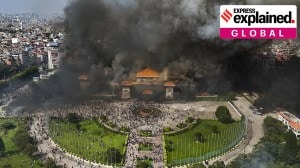Toll shoots up as Afghans dig deep
The death toll in the Afghan earthquake rose to at least 3,000 today as fresh aftershocks struck northern villages, the government said. Off...

The death toll in the Afghan earthquake rose to at least 3,000 today as fresh aftershocks struck northern villages, the government said.
Officials, who yesterday said around 2,000 people had died and thousands were injured from a series of tremors, now say the toll could be as high as 3,000. ‘‘Casualties have mounted dramatically after new after shocks early morning,’’ Defence Ministry spokesman Gulbuddin said.
‘‘The toll is going to go up as we dig through the rubble in Nahrin and reach outlying villages. There have been new casualties in Burkah, north of Nahrin,’’ he said. ‘‘The tens of thousands who have fled their homes have settled in the deserts and hills in the open air without food or water.’’
Hamid Karzai’s interim government appealed for international help, and met United Nations officials, aid agencies and international peacekeepers today to coordinate response.
Even as Interior Minister Yunus Qanooni said dealing with this tragedy was beyond the interim government, interim leader Hamid Karzai, visiting the areas affected, told survivors that everything possible was being done. ‘‘Our hearts are with you. Everything will be done,’’ Karzai told refugees who crowded near him.
Although UN aid agencies have rushed thousands of blankets and tents, as well as food and clothes, aid efforts have been hampered by the country’s poor road network. The UN Office for the Coordination of Humanitarian Affairs said two of the three roads serving the immediate area had been blocked by quake damage.
Government spokesman Yusuf Nourestani said that Russia planned to send a mobile clinic. The World Food Programme has sent 158 tonnes of food in addition to other UN and International Committee of the Red Cross aid.
International peacekeepers said that rescue workers have already dug 1,000 bodies out of the rubble. Flight Lieutenant Tony Lawrence of the International Security Assistance Force (ISAF), which has a reconnaissance team on the ground, said many more were feared dead.
The Pentagon said it was considering what it could do. ‘‘We’re working closely with the interim government on what kind of help we can provide,’’ Marine Lt. Col. Dave Lapan said.
To make matters worse for relief operations, experts said roads into Nahrin had been heavily mined during years conflict between the Northern Alliance and the Taliban.
‘‘There are a lot of anti-tank mines on the roads into Nahrin,’’ Guy Willoughby, director of the HALO Trust demining group, said. ‘‘The town was on the frontlines between the Alliance and the Taliban, and the Opposition forces had laid mines as a defence.’’ (Agencies).
Photos





- 01
- 02
- 03
- 04
- 05

























